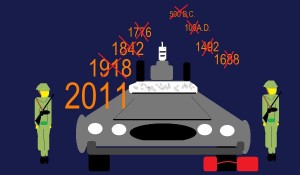Back to the Future, an American Recruiter Icon

DO THE TIME, DO THE CRIME/Image: Michael Moffa
“I like the dreams of the future better than the history of the past”—Thomas Jefferson
As a recruiter, you pretty much live for the future—the next job posting, the next applicant, the next interview, the next client, the next paycheck, retirement. The past is pretty much a collection of pay stubs, Rolodexed contacts for future use and thank yous. The history of recruiting interests you, if at all, much, much less than its future.
To test this supposition, ask yourself this: If you could be Michael J. Fox in “Back to the Future” and had to choose only one direction in time to travel, would you set the DeLorian time clock to a time in the past, or to somewhen in the future? If you were to choose the future, that would be a very American thing to do, even and especially if it meant risking finding yourself with your financial “back to the future wall”.
The Past: First Forgotten, Now Banished
As an icon of and insight into the American mind, “Back to the Future” (I, II and III) was a very revealingly titled movie trilogy. Although it had themes of DeLorian flux-capacitor-powered travel to the past, e.g., the 19th-century Wild West and 1950s high school hops, the explicitly and insightfully marketed focus was “The Future”—a quintessentially still-young America’s bold and farsighted preoccupation that continues to eclipse any interest in Old World traditions and in any ancient history, norms or languages.
Unlike still-traditional societies, like those of China and Afghanistan, in which tomorrow’s questions can even today elicit yesterday’s orthodox Confucian or scriptural answers, the U.S. has, from it’s inception, been overwhelmingly future-focused.
America is defined as a never-ending journey of limitless opportunity, beckoning horizons, “manifest destiny”, “new frontiers” and endless progress, always with an eye on the road ahead, not on the road behind, ever-receding in the rearview mirror, or a patch statically occupied as a moss-covered parking space on the landscape of history. Does this sound familiar? Does it sound like you?
If you are better at planning job placements than memorizing or even remembering resumes, this future-focus may be one reason for that: history is something others memorize; the future is something youplan.
Catching Up with America’s Past
However, that cultural gap is shrinking: “Still-traditional” is an endangered concept, since, like the U.S. before it, China, for one, is experiencing a collective shift to focusing on the future. The most striking evidence of this, apart from the breathtakingly rapid modernization of China, is a recent eyebrow-raising decree from the Chinese SARFT (State Administration for Radio, Film and Television) warning TV and movie producers to avoid all references to and themes of time-travel on TV and in film. That’s right: now, no references to or depictions of time travel are to be permitted in (new and possibly even existing) Chinese TV programming or movies.
The stated (Stated) reason for the de facto ban, announced in April 2011, is that such time-travel themes are “disrespectful” of history, and that “the producers and writers are treating serious history in a frivolous way, which should by no means be encouraged any longer,”( Li Jingsheng, head of television drama at SARFT, quoted at http://www.metro.co.uk/news/861018-china-bans-time-travel-on-tv-and-at-the-cinema#ixzz1MkBPk9RL). (Note: “Not encouraged” translates as “prohibited”, or vice versa.)
It has been speculated that among the more compelling or actual reasons for the warning-cum-ban is bureaucratic discomfort with the very American idea that a single individual, like future human guerilla fighter “Kyle Reese” (Michael Biehn) in the 1984 Schwarzenegger blockbuster “The Terminator” or “Marty McFly” (Michael J. Fox) in “Back to the Future” could overcome or disrupt the (collective, progressive and natural) forces of history.
Another worry at the top is that the Chinese viewing public may unfavorably compare modern China with some idealized and fabled golden age in the past. Otherwise (and my own guess), it is possible that widespread fascination with time travel might cause a slump in the conventional domestic China travel industry during the busy Chinese New Year holidays, with unforeseeable and rippling consequences for the Chinese economy, as millions of disgruntled travelers refuse to book anything but a trip to, say, one of Confucius’ New Year parties. “No, no….no Shanghai. Tickets for two to the Ming dynasty, please!”
An Area of Unexpected Agreement
So, the modern Chinese recruiter is likely to continue sharing your focus on the future, but now with an official government blessing and warning to do so.
One reason why Americans need or will get no such governmental assist is that they—ironically, just like the SARTF—already see the golden age as being situated in the technologically, scientifically and economically present and/or more advanced future. A second reason is that collectively and individually Americans would mightily protest such a heavy-handed ruling—after heartily laughing at it.
If you are a U.S. recruiter, you can blithely continue your future-focused ways, ignore or forget history and yesterday, and move on and forward, confident that you have both American cultural history and Chinese government policy backing you up…
…to the future.

